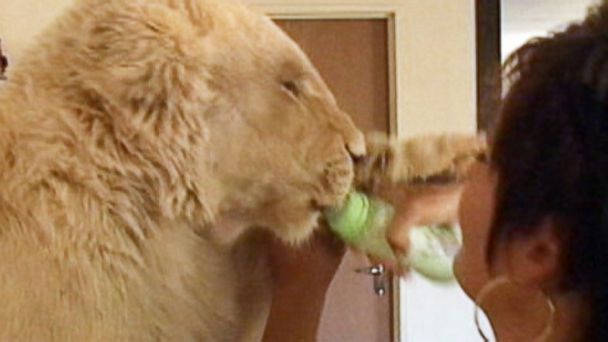Big Cats, Others Predators Just Part of the Family on South Africa Farm
Twenty minutes down a dusty and bumpy road in the South African bush, a sign reading "Predator Park" marks the entrance to Annel Snyman's Loebies farm.
The farmhouses lie on an idyllic patch of grass and trees behind enclosures that hold lions, caracals, servals and a single adult leopard.
Playing tantalizingly close to the pacing cats are a mongoose, mischievous meerkats, befuddled dachshunds and Snyman's large mastiff, Diesel.
It's immediately clear upon entering the house Snyman shares with her boyfriend, Sean Weber, that it is not totally theirs. The furniture is threadbare, there are animal bowls lying around, and then there are the lion and leopard cubs lounging on the bed. At least four of the animals sleep with the couple at night.
Three years ago, Snyman opened Loebies Guest Farm, one of countless small animal parks that have sprung up in South Africa to feed the massive wildlife tourism industry.

At Annel Snyman's Loebies Farm in South Africa, lions and other wild animals are just part of the family. (Credit: ABC News)
Snyman hosts school groups and overnight visitors at the farm where they're allowed to touch the cubs and the smaller cats. Sometimes let out of her pen for petting and feeding is the 10-month-old white lioness Vati, 130 pounds of muscle and razor-sharp teeth.
In the house, she acts like a house cat, hopping up on the kitchen counter and growling her displeasure when her feeding bottle is taken away from her.
Snyman and Weber shy away from talking about the business side of the farm while playing up the conservation takeaway guests can experience.
"You have people coming out here who don't have the opportunity to spend time in the wild and experience the lions up close," said Weber, who helps take care of the animals. "So you have the youngsters coming out here, they're getting up close … and it now means something to them."
But conservation experts disagree that small parks like Loebies can have any real impact on conservation. Instead, they point to the fact that lions - and other cats - raised in captivity on farms like this one can never be introduced into the wild.
"You can never take them and train them possibly in any way so that they become effective at being a wild animal, they never will be," said Luke Hunter, president of the Panthera group, a global wildcat conservation organization. "So claiming that keeping a lion as a pet has something to do with conservation is really, really dubious."
It's more about making money off the animals, Hunter said, which in turn fuels the demand to breed more animals for captivity.
There are eight times more lions in captivity in South Africa than in the wild. The lions' natural habitat has shrunk precipitouslywith human population growth, to the point where there's little room left to introduce lions into the wild.
Without a hint of hesitation or fear, Snyman goes into the lions' pens to feed them and shower them with affection, which they return in kind. Weber doesn't go in, nor do they let visitors do more than pet the big lions through the fence. Snyman insists her animals are less her pets than they are her children, who see her as their mother.
"I raised them, so I trust them and they trust me," she said.
While Hunter agrees that Snyman's animals would see her as a doting mother, he said it doesn't take away from the fact that they have natural predatory instincts.
"Big cats are really dangerous animals. They've really had - in the case of lions - a million years or more of evolution to become a supremely adapted killer, and they don't make good pets," he warns. "It's really dangerous to think that there's no danger."
Hunter points to Siegfriend and Roy's tiger attack. And this past weekend, a longtime staff member at an Oregon wildcat sanctuary was mauled to death by cougars.
Snyman shrugs off any worries about her safety and said that she hoped to grow the farm in the coming years. Wild dogs, hyenas and cheetahs were on the list of animals she wants to add to the collection.
"Things people don't see, things people don't know about," she said. "That's what I want to do."